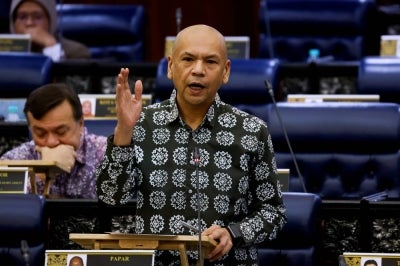Qamarul Azarin: From site supervisor to a dedicated teacher in Sarawak
Numerous teaching methods and strategies could be seamlessly employed for instructing in a rural environment, with no challenges in adjusting to them.


SHAH ALAM - A former site supervisor who transitioned to become a teacher in Sarawak shared his journey of career transition, highlighting the fulfilment he finds in teaching in Sarawak and offering valuable insights into the realities of teaching in the region.
A former construction worker, Qamarul Azarin, 26, made a life-changing decision to join Teach For Malaysia (TFM), trading blueprints for lesson plans in a rural Sarawakian school.
When asked about his shift from being a site supervisor in the construction industry to teaching in a rural area of Sarawak, Qamarul reflected on the intriguing nature of the change.
“While there are certainly advantages and drawbacks in both the education and construction sectors, transitioning to become a teacher in a rural area of Sarawak has proven to be one of the greatest decisions I have made in my life thus far,” he said.
Qamarul also said that numerous teaching methods and strategies could be seamlessly employed for instructing in a rural environment, with no challenges in adjusting to them.
“It merely requires passion and dedication.
“By fostering a love for teaching and investing effort in crafting lesson plans and activities, educators can create an inclusive learning environment where all students can thrive together,” he added.
Qamarul also stressed that teaching fills him with immense joy, despite the initial hurdles and occasional challenges, such as being a thousand miles away from his wife.
“When I began this new chapter, I had only been married for a few months and the unwavering support of my wife and family has been invaluable.
“Witnessing the moment when students understand difficult topics in class, fills me with immense satisfaction.
“My motivation stems from the belief that by giving my best, I can empower these students to unlock their full potential, knowing that someone cares deeply about their success,” he said.
Qamarul also firmly believed that any great accomplishments often demand sacrifices.
“With unwavering passion and determination to impact students' education positively, no obstacle can hinder your progress.
“Stay committed to your goals, maintain honesty in your endeavours and consistently reflect on your journey,” he said.
The 26-year-old teacher, teaching in Sekolah Kebangsaan Landeh, Kuching, Sarawak, highlighted that the fundamental contrast between rural and urban areas does not necessarily lie with the students themselves, but rather in the opportunities available to them.
“There is a notable discrepancy in access to basic necessities, both within and outside the school environment. While every student deserves a quality education, it is essential to consider whether their surroundings facilitate their learning and development effectively.
“In all honesty, improving educational outcomes in rural areas requires a concerted effort from the government and relevant authorities, focusing on better maintenance of school facilities and increased funding.
“Ensuring that students have access to top-notch resources and conducive learning environments is paramount. Ultimately, the key lies in providing abundant opportunities for these students to thrive,” he emphasised.
Drawing from his teaching experience in Sarawak, Qamarul acknowledged the obstacles that often dissuade educators from accepting postings in this region.
“To attract more teachers to Sabah and Sarawak, the government could introduce enhanced incentives like housing allowances, relocation assistance and specialised professional development programmes tailored to the specific requirements of these areas.
“Upgrading infrastructure and facilities within schools would also yield substantial benefits. Additionally, establishing a robust support system for teachers and nurturing a sense of community can address apprehensions.
“I am confident that with these enhancements, more educators will be motivated to participate in the educational advancement of these regions,” he added.
Qamarul also wholeheartedly encouraged others to join TFM, particularly the Fellowship programme.
“Through close collaboration with schools and local communities, you will directly tackle educational inequity from its core.
“Additionally, you will forge valuable connections with a diverse network of alumni, partners and mentors who will offer unwavering support and guidance as you navigate your leadership journey.
“Together, we can transform the educational landscape and ensure that every student receives equitable access to quality education, fuelled by the dedication and passion of aspiring individuals,” he said.
Download Sinar Daily application.Click Here!















